-

人教版新目标初中英语八年级下册He said I was hard-working教案2篇
This activity introduces some new vocabulary and provide oral practice using the target language.Task 1 . Ask four students to stand in front of the class, and the teacher asks them the following questions as a reporter.1.What are you going to do when you grow up?2.What are you going to do next week?3.What are going to do after school?The students will give different answers, then ask a good student to report what they said.I am going to e a doctor.What did she say?----------She said she was going to be a doctor.I am going to have a party on Friday night.What did he say?-------He said he was going to have a party on Friday night.I am going to do my homework.What did she say ?------ She said she was going to do her homework.I am going home after school.What did she say?-----She said she was going home after school.Say In this unit we are going to learn to use words like to report what someone said.Task 2. Read the instructions. Then ask a student to read the four questions. And write the words on the Bb. Explain what soap opera is.Task 3. Ask the students to Look at the pictures, point out the TV screens in the picture. Ask one girl to read what Marcia said.What did Marcia say? She said She said she was having a surprise party for Lana on Friday night. Repeat the other pictures in the same way.Activity3. Listen and number the pictures in activity 1a.

人教版新目标初中英语八年级下册What were you doing when the UFO arrived教案2篇
(一).知识方面: 1.培养学生能运用过去进行时来描述、谈论过去某个时间正在发生的事情或动作的意识和能力,能就过去某个时间正在发生的动作做出正确的描述。 2.培养学生的想象力和角色扮演的合作能力。 3.培养学生讲述过去发生的事情经过的能力。能正确运用一般过去时来讲述故事。 (二).技能方面: 1.本单元的语言目标是Talk about past events and tell a story(谈论过去的时间和讲述一个故事),围绕这一目标,要涉及句型: What were you doing when the UFO arrived? ----I was sitting in the barber’s chair. The barber was cutting my hair. 因此必须学习standing、studying、cleaning、sleeping、cooking、making、eating、cutting、等表示地点的词,以便为上述句型提供语言材料。2.学习过去进行时的有关知识。Was/were+现在分词,是该时态的表达式。 3.在学习过程中,要区分The boy was walking down the street when the UFO landed.和While the boy was walking down the street, the UFO landed.这两种由when和while引导的状语从句的句型结构。注意它们的不同。
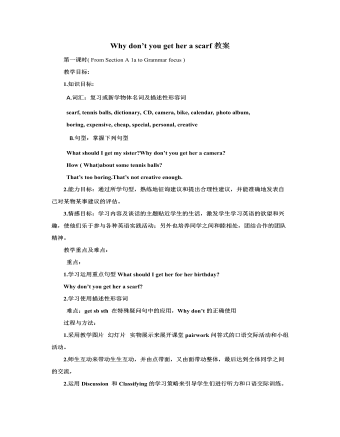
人教版新目标初中英语八年级下册Why don’t you get her a scarf教案
教师带领学生复习有关描述宠物的词汇,采用教师提问学生回答的方进行。如:T:What animals do you think would be good pets?What animals do you think would be bad pets?What do you think are good animals for a six-year-old child?然后学生进行 pairwork 练习。Task two: 师生互动,学习探究 1、播放3a部分的录音,引导学生一边听录音,一边跟读。2、通过听录音学生回答以下问题:Why do you think pot-bellied pigs are popular?What are the advantages and disadvantages of keeping such a pet?教师对学生的回答进行及时点评。3.学习范文,学习重点短语,为下步的模仿写作提供语言素材。T :1. )Have you ever kept a pig as a pet?Do you like pigs? St.:No.…Why don’t you like to keep a pig? St: No.They’re too dirty and lazy(Do you know in some foreign countries like Hollyland, Australia,pigs are the most popular pet.there’s a kind of pig.(图)it has an interesting name? it ‘s called a pot-bellied pig.) Now,let’s learn an article about this kind of interesting pet.2.)play the tapeSt.:Listen and repeat3.)show some Qs on computer(本子St.: read silently,then answerthe Qs(本子)4.)Ask ss. Close book and retell this passage.(what is a pot-bellied pig? Is it a good or bad pet? ) St.: retell it to each other“A pot –bellied pig is a popular pet now…”5.read the article together.St.:.practice reading

人教版新目标初中英语九年级上册Teenagers should be allowed to choose their own clothes教案2篇
Step 1 Greeting Greet the class and check the homeworkStep 2 A duty report The S on duty gives a report on the rules in his home and lead in 3a “Sun Fei’s and Wu Yu’s rules” Step 3 ReadingSs read the conversation and write the two girls’ rules in the chart. Check the answers.Get Ss to read after the tape and then read aloud by themselves. Then, T explains the language points.Step 4 Pairwork 3bRole play. Use the information in chart to practice with the conversation in 3a covered. They can look at the sample conversation in the right box.Step 5 Task 2 “Who’s the best reporter?”Make a survey by asking any 5 students the questions in the chart in activity 4. Then give out a report about it. See who is the best reporter? And the best reporter will get a nice ball-pen.Step 6 Summary and homework:Write out the report in your exercise-books.Period ThreeStep 1 Greeting and a duty reportThe S gives a duty report talking about his experience of being late for school. Lead in the question “Do you ever get to school late? How often do you get to school late? Always, usually, sometimes, or never?Step 2 1a Get Ss to finish writing.Step 3 Pairwork 1b Get Ss to talk about their answers with their partners using the sample conversation in the box on the right.Step 4 Listening practice2a Lead-in: What will happen if you get to school late? What about Peter? Let’s listen to a conversation between Peter and his father. Get Ss to finish 2a (As usual, for the first time, Ss only listen.) Check the answers.
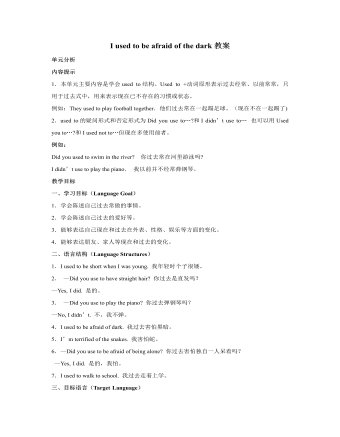
人教版新目标初中英语九年级上册I used to be afraid of the dark教案
内容提示1.本单元主要内容是学会used to结构。Used to +动词原形表示过去经常、以前常常,只用于过去式中,用来表示现在已不存在的习惯或状态。例如:They used to play football together.他们过去常在一起蹋足球。(现在不在一起踢了)2.used to的疑问形式和否定形式为Did you use to…?和I didn’t use to… 也可以用Used you to…?和I used not to…但现在多使用前者。例如:Did you used to swim in the river? 你过去常在河里游泳吗?I didn’t use to play the piano. 我以前并不经常弹钢琴。教学目标一、学习目标(Language Goal) 1.学会陈述自己过去常做的事情。2.学会陈述自己过去的爱好等。3.能够表达自己现在和过去在外表、性格、娱乐等方面的变化。4.能够表达朋友、家人等现在和过去的变化。二、语言结构(Language Structures) 1.I used to be short when I was young. 我年轻时个子很矮。 2. —Did you use to have straight hair? 你过去是直发吗?—Yes, I did. 是的。 3. —Did you use to play the piano? 你过去弹钢琴吗?—No, I didn’t. 不,我不弹。 4.I used to be afraid of dark. 我过去害怕黑暗。 5.I’m terrified of the snakes. 我害怕蛇。

人教版新目标初中英语九年级下册By the time I got outside, the bus had already left教案
Ⅰ. Teaching Aims and Demands1. Knowledge Objects(1) Key Vocabularyoversleep(2) Target LanguageWhat happened?I overslept. And by the time I got up, my brother had already gotten in the shower.2. Ability Objects(1) Teach the students to use the new words.(2) Train the students to narrate past events with the Past Perfect Tense.(3) Train the students' listening and speaking skills with the target language.3. Moral ObjectIt’s a good habit to go to bed early in the evening and get up early in the morning. So you’ll never be in a hurry in the morning.Ⅱ. Teaching Key Points1. Key Vocabularyoversleep2. Target LanguageNarrate past events with the Past Perfect TenseⅢ. Teaching Difficult Points1. Train the students to narrate past events with the Past Perfect Tense.2. Train the students to understand the target language in spoken conversation.Ⅳ. Teaching Methods1. Thinking of examples from the students' real lives.2. Making sentences by looking at the pictures.Ⅴ. Teaching AidA tape recorderⅥ. Teaching ProceduresStep I Revision1. Revise the language points in Unit 8.Ask some questions like this: What volunteer work would you like to do?Help the students to answer, I’d like to…/I love to…/I hope to2. Practice the dialogue in Activity 3c on page 62 again. Get students to role play the similar dialogues with the following.

人教版新目标初中英语九年级下册I’ll help clean up the city parks教案
Talk about offering help (P60)I’ll help clean up the city parks.A: I’d like to work ...B: You could help ...Talk about ways to tell people about the Clean-Up Day (P61)We need to ...We can’t ...I’ll ...Talk about the work the volunteers do (P62)These three students all volunteer their time to help other people.Somebody loves to ... / helps ... / plans to ... / wants to ...A: What do you like doing?B: I like ... A: What kind of volunteer work do you think I could do?B: You could ...1. 重点词汇advertisement, fix, repair, pleasure, blind, deaf, shut, carry, specially, fetch2. 认读词汇hunger, homeless, cheer, clean-up, sign, establish, major, commitment, elementary, veterinarian, coach, similar, call-in, strategy, disabled, organization, unable, support, appreciate, donation, part of speech, pronoun, adverb, preposition, conjunction, donate, Jimmy, Sally3. 词组clean up, cheer up, give out, put off, set up, think up, take after, fix up, give away, put up, hand out, work out, at once

人教版新目标初中英语九年级下册We’re trying to save the manatees教案2篇
本单元主要围绕着有关濒临灭绝的动物这一话题,学习了应该怎样保护我们的环境,以及就某一问题展开辩论。目标提示语言目标能够运用所学知识,就某一问题展开辩论。认知目标1、复习一些语法:现在进行时、一般现在时、用used to 表示一般过去时、现在完成时、一般过去时的被动语态。2、学会表达同意和不同意。3、学会以下基本句型:We’re trying to save the manatees.Manatees eat about 100 pounds of food a day.There used to be a lot of manatees.In 1972,it was discovered that they were endangered.Some of the swamps have become polluted.情感目标了解一些濒临灭绝的动物的生活习性和濒临灭绝的原因,教育学生应该如何保护环境。教学提示充分利用多媒体等教学设备,创设与本课话题相关的情境,如各种不同种类的动物、动物园以及有关环境的画画等等。围绕着本单元的教学目标,设计一些贴近学生实际的教学任务,如让学生谈论自己最喜欢的动物,如何拯救濒危动物,如何保护环境等等。让学生根据所学知识,就动物园是否对动物有利以及其他的话题进行辩论。

人教版新目标初中英语九年级下册You’re supposed to shake hands教案
教学目标:1. 掌握本单元一些重点词汇的写法和用法。2. 学会自如谈论餐桌礼仪。Step 1 RevisionAsk some students to retell the customs at the table in France in the passage in 3a.Step 2 Self checkPart 1. Fill in each bland with the correct word given. Students do the exercises by themselves at first. Then check the answers. Ask the students to comprehend the sentences and help them point out uses of some words, like “arrive (at / in) sw., spend time / money on sth , spend time / money (in) doing sth.”Part 2. Read about Fan Ling’s experience in a western restaurant. Understand the passage. Point out some key points in the passage.1. be / get used to doing sth. 习惯做某事2. begin with = start with 以….开头3. crowd v. 挤满,塞满 the crowd 人群 crowded adj. 拥挤的Then students discuss about how she would solve her problem. Ask some to share their stories with others.Part 3. Complete the crossword by looking at the sentences on the left. Then check the answers.

人教版高中历史必修2第二次工业革命教案2篇
请回答:根据上述材料,概述第二次工业革命兴起的主要原因。〖参考答案〗①政治上,资本主义制度在世界范围内的确立,为第二次工业革命提供了政权保障。②市场上,世界市场进一步拓展,推动生产进步发展。③科技上,19世纪自然科学的飞速发展与重大突破。④劳动力上,拥有更多、素质更好的自由劳动力。⑤经济上,拥有更加雄厚的资本。探索攻关二:第二次工业革命与垄断组织的出现的关系材料一第二次工业革命产生的新兴工业部门,在厂房、设备、技术要求和产品结构的复杂性等方面,都对生产组织提出了新的要求。这是过去的独家企业无法满足的,而且一般没有足够的资金。……于是,集中资金的合股公司迅速增加起来,起大型企业垄断组织也就应运而生。
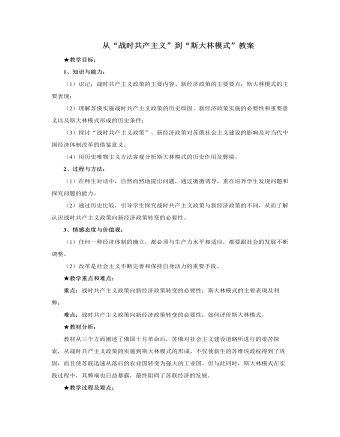
人教版高中历史必修2从“战时共产主义”到“斯大林模式”教案
5、弊端:(1)经济发展不均衡,片面发展重工业,使轻工业和农业长期处于落后状态;(2)对农民的剥夺太重,挫伤了农民的生产积极性;(3)长期执行指令性计划严重削弱了企业的生产自主权,不利于发挥企业的生产积极性,制约了苏联经济的可持续发展。(4)计划经济体制确立后,没有随着社会的变化进行调整,二战后逐渐僵化,丧失了自我完善的功能,成为苏联解体的重要因素。【合作探究】斯大林模式的评价及经验教训:积极:①使苏联迅速实现了 工业化②苏联经济实力的迅速增长,为反法西斯战争的胜利奠定了 物质基础 。消极:①政治:高度集权,破坏了 民主与法制 ; ②经济:优先发展重工业使 农业和轻工业长期处于落后状态,农民生产积极性不高;计划指令,压制了地方和企业的积极性,阻碍苏联经济的发展高度集中的计划经济体制,成为东欧剧变和苏联解体的重要原因。

人教版高中历史必修3从“师夷长技”到维新变法教案
4、维新思想推动下的变法运动虽然失败了。但这是中国近代真正意义上的一次思想解放潮流,为什么?展开:维新派提倡西学,兴民权,对封建专制制度和传统观念进行了冲击,促进了中国人民的觉醒,为资产阶级民主思想的传播奠定了基础,具有思想解放的启蒙作用。是一次救亡图存的爱国运动,也是一次发展资本主义的改革运动;他们提倡资产阶级新学,批判封建主义旧学,引导人们重新认识世界,他们痛感民族危机的严重,号召人们奋起救国,谋求国家的独立富强;给古老的中国社会注入的活力是不可低估的,站在历史长河的高度看,由传统农耕社会向近代工业社会转变是一股不可抗拒的历史潮流,尽管它在19世纪末的中国遭到了暂时挫折,但对清朝的封建专制统治却是一次巨大的强烈的冲击波,它留下的痕迹是永不磨灭的,是永远鼓舞与启迪后人的。
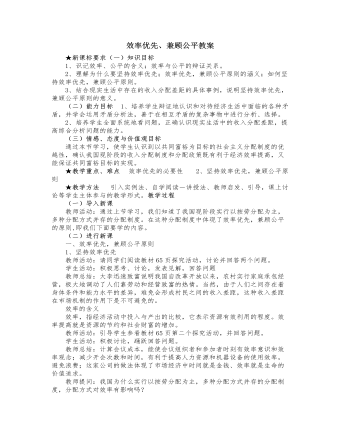
人教版高中政治必修1效率优先、兼顾公平教案
教师活动:引导学生阅读教材67页,回答:什么是效率优先,兼顾公平?如何贯彻此原则?学生活动:阅读课本,认真总结,发表见解教师点评:效率优先,实质是发展生产力优先,分配制度和分配政策要以促进生产力的发展和经济效益的提高为首要目标;兼顾公平,是指社会要将收入差距控制在合理的范围内,使分配的结果能促使人们奋进,社会具有生机喝活力。坚持效率优先、兼顾公平,首先,要允许和鼓励一部分地区和个人通过诚实劳动和合法经营先富起来,先富带后富,最终达到共同富裕。其次,既要反对平均主义,又要防止收入差距悬殊;既要落实分配政策,又要提倡奉献精神。再次,必须正确处理初次分配注重效率与再分配注重公平的关系。初次分配注重效率有利于充分调动人们的积极性。在再分配中,要加强政府对收入分配的调节,调节过高收入,取缔非法收入,提高低收入者的收入水平,通过完善社会保障制度等,把收入差距控制在一定范围之内。
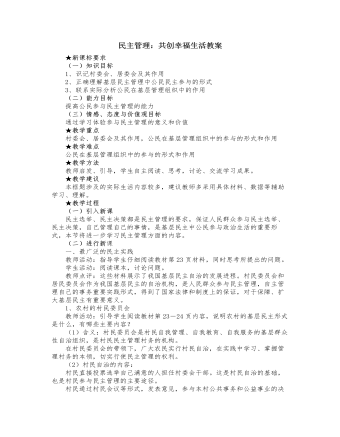
人教版高中政治必修2民主管理:共创幸福生活教案
教师活动:请同学们阅读教材P26页图表,思考所提的问题。学生活动:阅读课本,积极思考。教师点评:公民应在本地事务中增强主人翁责任感,积极参与民主管理。在参与民主管理的过程中,学习民主管理的知识和技能,体验民主管理的意义和价值,逐步增强和提高自己政治参与的责任意识和实际本领。2、青年学生应积极参与民主管理青年学生应着眼于未来发展,积极参与民主管理。在基层民主自治这种最广泛的民主实践中,获得更多民主管理机会,以不同方式尝试参与参与民主管理活动。在参与民主管理的过程中,学习民主管理的知识和技能,体验民主管理的意义和价值,逐步增强和提高自己政治参与的责任意识和实际本领。(三)课堂总结、点评本节内容讲述了我国的基层民主管理形式和主要内容,明确了积极参与基层民主管理的重要意义,这对我们提高自身政治素质,增强参与政治生活的责任感和能力等,有重大作用。
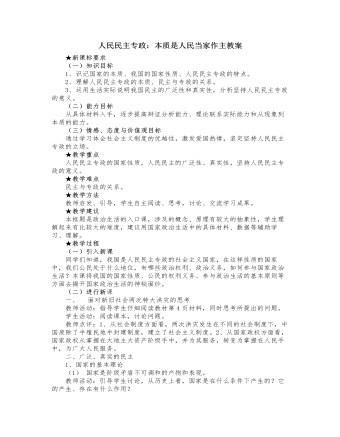
人教版高中政治必修2人民民主专政:本质是人民当家作主教案
三、坚持人民民主专政教师活动:请同学们阅读教材P7页,思考下列问题:为什么要坚持人民民主专政?现阶段如何坚持人民民主专政?学生活动:阅读课本,找出问题。1、坚持人民民主专政的重要性(1)坚持人民民主专政是四项基本原则之一,是我国的立国之本。(2)坚持人民民主专政是现代化建设的政治保证。坚持人民民主,才能调动人民现代化建设的积极性;坚持对敌对势力的专政,才能保障人民民主,维护国家安定。2、坚持人民民主专政的新的时代内容突出经济建设服务职能;为改革开放和现代化建设创造良好国内外环境;重视法制建设,依法治国;发展人民民主,加强民主制度建设。(三)课堂总结、点评本节内容讲述了我国的国家性质的有关知识,懂得我国是人民民主专政的社会主义国家,其本质是人民当家作主,我国的人民民主具有广泛性和真实性,是真正的大多数人的统治,必须坚持人民民主专政。
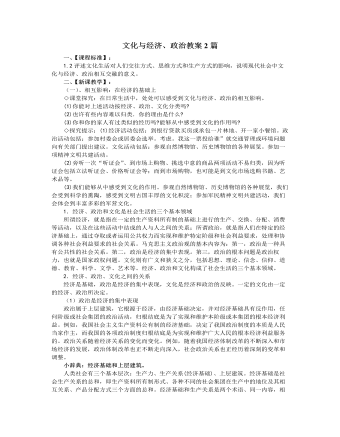
人教版高中政治必修3文化与经济、政治教案2篇
1.在激烈的国际竞争中,美国为首“巴统”在对中国出口高科技产品的问题上采取了种种限制措施,以避免西方发达国家的高科技技术和设备流人中国。面对发达国家的技术封锁,我们应该( )A.加速我国对外开放的步伐B.尽快改善与西方发达国家的关系C.努力提高自身的科技水平,增强本国的综合国力D.立足于自力更生,努力开发所有的高科技技术,以免受制于人答案:C解析:在当今和未来的世界,经济是基础,科技是龙头。因而,发展经济和科学技术是世界大多数国家最关心的问题。各国之间的竞争越来越多地转向经济和科技领域。各国都已经清楚地认识到,能否在科技发展上取得优势,增强以经;济和科技为基础的综合国力,最终将决定本国在国际上的地位。受各种主客观条件的限制,任何国家都不可能开发出自己所需要的所有技术,国家之间必须加强技术交流,互通有无,共同发展。“巴统”对我国进行技术出口方面的限制是基于其敌视中国的战略需要。为了打破西方国家的对我国的技术限制,我国必须从自身出发,提高自身的科技水平。
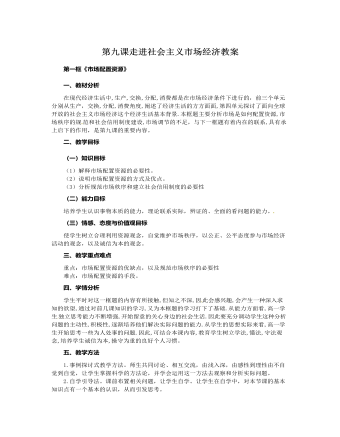
人教版高中政治必修1第九课走进社会主义市场经济教案
法律手段:制定和运用经济法规,包括经济立法、经济司法活动等行政手段:采取强制性的行政命令、指示、规定等运用举例:我国一些地区遭遇突如其来的“禽流感”,禽类养殖户损失惨重。国家采取了对疫区封锁,对疫区的养殖户进行经济补贴,以及国家出资统一对疫区进行消毒等措施进行防治,并规定任何人不得将家禽带出疫区,违者追究法律责任。请结合材料说明在防治“禽流感”、发展禽类养殖的过程中,我国政府分别采取了哪些措施教师分析:对疫区养殖户进行经济补贴体现经济手段;对违反规定者追究法律责任,体现法律手段;对疫区进行封锁体现行政手段。(四)反思总结,当堂检测。教师组织学生反思本节课的主要内容(参照板书),进行总结。设计意图:对本节课的内容进行小结,学生的概括过程也是检验学生对本节课理解程度的过程。再次明确学生是学习的主体,并能够发现,问题解决问题。
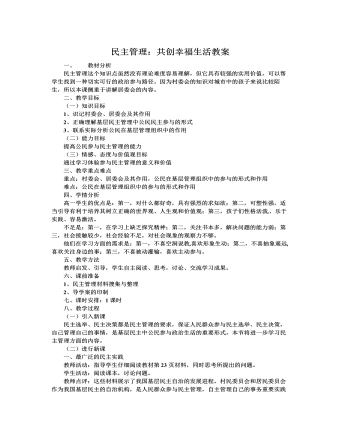
人教版高中政治必修2民主管理:共创幸福生活教案
一、 教材分析民主管理这个知识点虽然没有理论难度容易理解,但它具有较强的实用价值,可以帮学生找到一种切实可行的政治参与路径。因为村委会的知识对城市中的孩子来说比较陌生,所以本课侧重于讲解居委会的内容。二、教学目标(一)知识目标1、识记村委会、居委会及其作用2、正确理解基层民主管理中公民民主参与的形式3、联系实际分析公民在基层管理组织中的作用(二)能力目标提高公民参与民主管理的能力(三)情感、态度与价值观目标通过学习体验参与民主管理的意义和价值三、教学重点难点重点:村委会、居委会及其作用,公民在基层管理组织中的参与的形式和作用难点:公民在基层管理组织中的参与的形式和作用四、学情分析高一学生的优点是:第一,对什么都好奇,具有强烈的求知欲;第二,可塑性强,适当引导有利于培养其树立正确的世界观、人生观和价值观;第三,孩子们性格活泼,、乐于实践、容易激活。
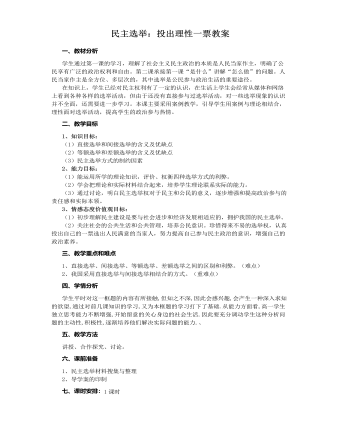
人教版高中政治必修2民主选举:投出理性一票教案
1、第一,材料一和材料二的选举方式有什么异同?(1)相同点:①都采用了演讲和答辩等形式,都带有竞选的性质;②都采用无记名、直接选举的方式进行投票选举;③都属于差额选举。(2)不同点:①材料一是对村主任进行的正式选举,结果是直接产生村主任,材料二是对镇长候选人进行的选举,结果只是确定镇长候选人,镇长人选还有待进行正式选举;②材料一是全体村民都参加选举,材料二是各户派代表参加选举;③材料二比材料一更强调竞选的方式。第二,你还知道哪些选举方式?除了直接选举外,还有间接选举、等额选举、差额选举等。第三,你能对这几种选举方式的意义和效果,作出自己的评估吗?这是学习中要探究的问题,这里不一定能回答出来,等到学完本框内容后,可以得出比较明确的答案。第四,材料三给了你什么启示?这个问题不要求统一的答案,能讲出一两点即可。提示如下:(1)新中国成立后,选举制度经历半个多世纪的发展,正在逐步走向完善;
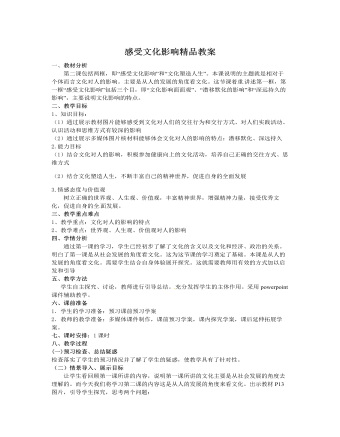
人教版高中政治必修3感受文化影响精品教案
(三)合作探究、精讲点拨 【情景导入,感受文化的影响】用多媒体展示教材“活动探究”P13的内容(图文并茂)情景问题:① 从这两幅画面中发现了哪些文化上的区别?你还能举出更多的事例吗?② 面对我们祖先创造的精美文化产品,人们的感慨,既有差异,又有共同之处。你能否解释这是为什么?(学生讨论、回答)情景问题:让学生阅读“活动探究”情景,带着这些问题去思考、合作、探究,在学生交流、探究的基础上,分组派代表完成这些问题,突出了学生的主体地位。设计意图:1、开门见山的方式引导学生进行新的学习探究活动,创设问题情景,引起悬念,吸引学生的注意力,激发学生的学习兴趣和探究欲望。2、通过自主探究,让学生感悟到道理越辩越明,促使学生存疑、质疑,从而产生强烈的探究欲望。

